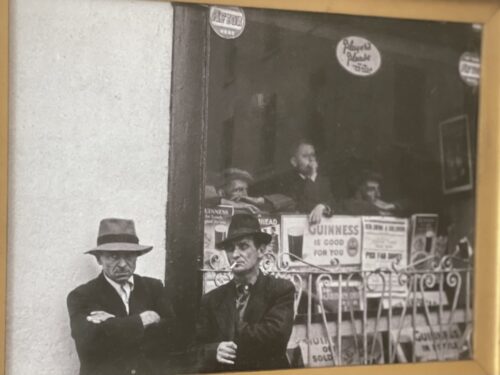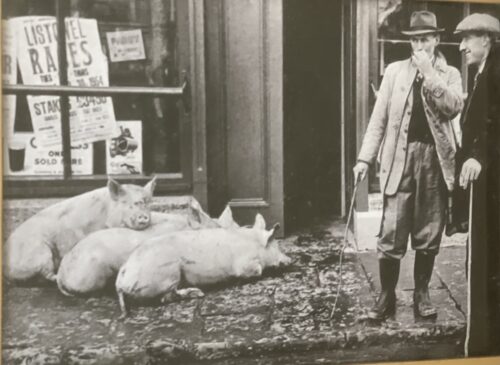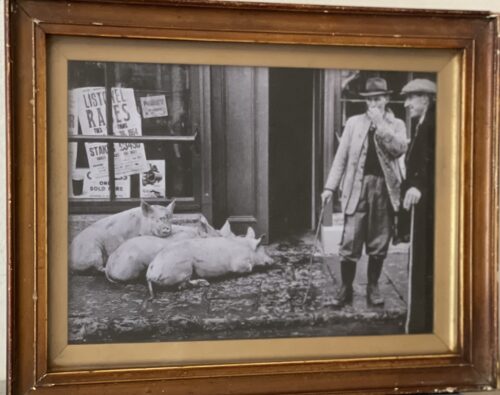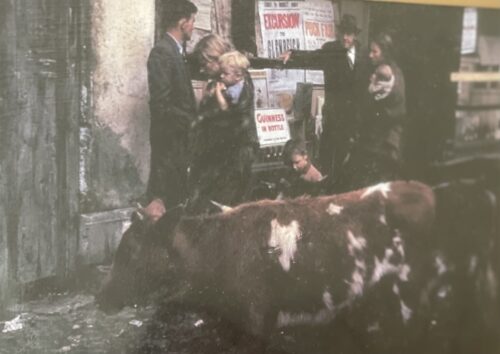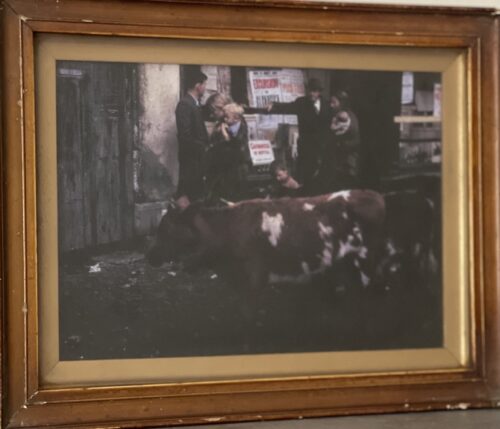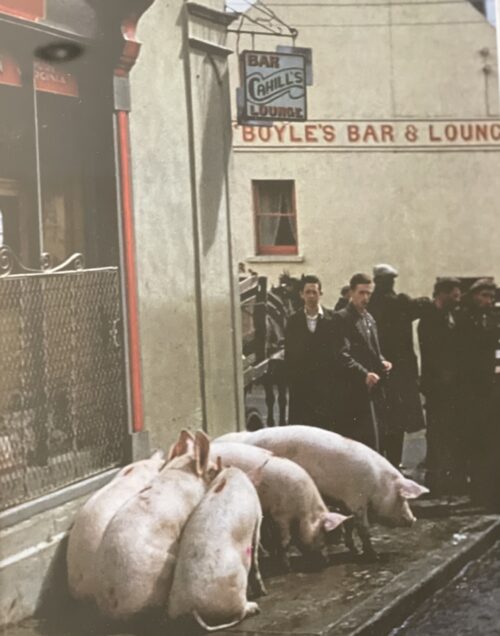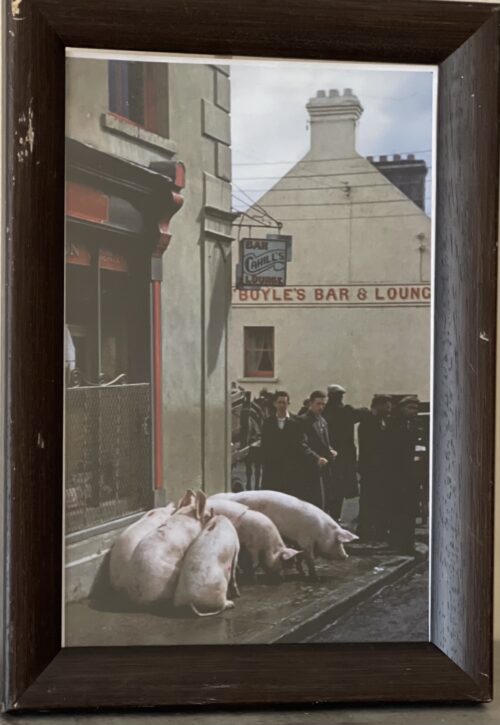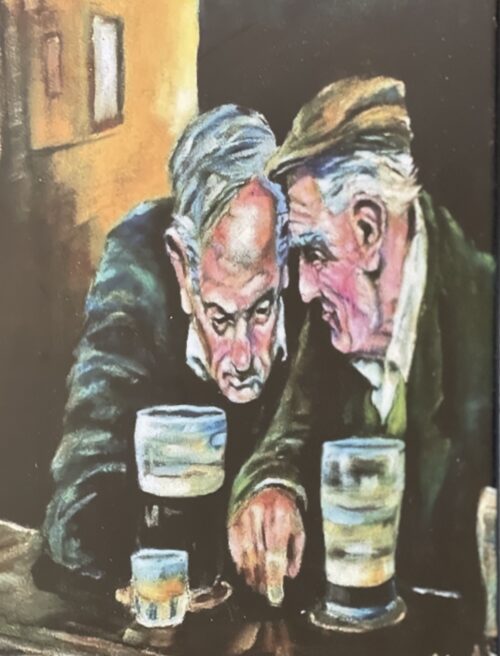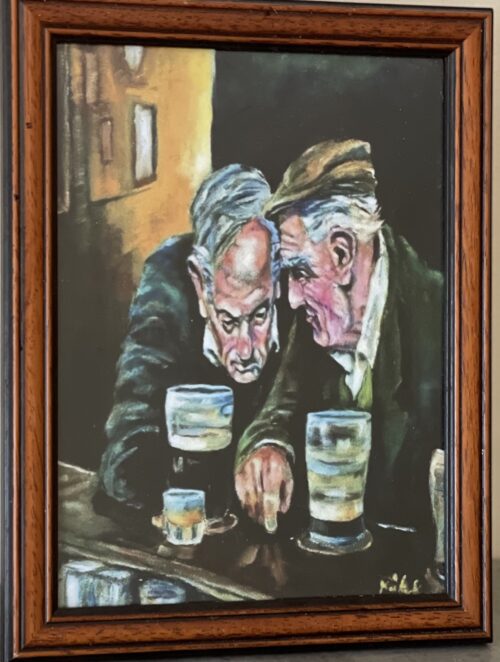-
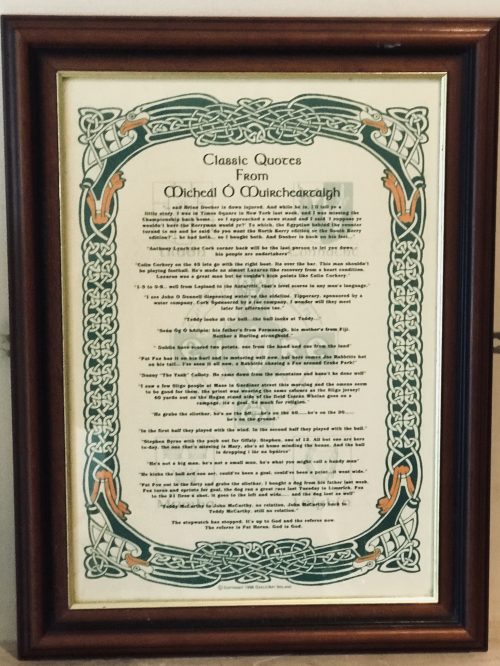 Brilliant print capturing some of Micheal "Ó'Muircheartaigh's most famous moments of commentary over the decades.Superb piece for the GAA enthusiast and celebrating one of our greatest ever broadcasters. Origins : Banagher Co Offaly Dimensions: 52cm x 40cm Micheal Ó Muircheartaigh (born 20 August 1930)[1] is an Irish Gaelic games commentator for the Irish national radio and television, RTÉ. In a career that has spanned six decades he has come to be regarded as the "voice of Gaelic games." His prolific career has earned him a place in Guinness World Records.
Brilliant print capturing some of Micheal "Ó'Muircheartaigh's most famous moments of commentary over the decades.Superb piece for the GAA enthusiast and celebrating one of our greatest ever broadcasters. Origins : Banagher Co Offaly Dimensions: 52cm x 40cm Micheal Ó Muircheartaigh (born 20 August 1930)[1] is an Irish Gaelic games commentator for the Irish national radio and television, RTÉ. In a career that has spanned six decades he has come to be regarded as the "voice of Gaelic games." His prolific career has earned him a place in Guinness World Records.Early life
Mícheál Ó Muircheartaigh was born in Dún Síon just outside Dingle, County Kerry in 1930.Ó Muircheartaigh grew up on the family farm and was educated locally in Dingle. In September 1945 he began studying at Coláiste Íosagáin in Baile Bhúirne in the County Cork Gaeltacht where he was in training to be a teacher. It was at this all-Irish school that his name changed from Michael Moriarty to the Irish version Mícheál Ó Muircheartaigh. In September 1948 he began the final year of his teacher training at St Patrick's College of Education in Drumcondra, Dublin.Broadcasting career
In early March 1949 Ó Muircheartaigh, along with ten other students from the college, and several from other colleges, did a test commentary on a hurling game at Croke Park. Each student had to commentate for five minutes in Irish and the most successful would be selected for further commentary work. Ó Muircheartaigh had never seen a game of hurling before in his life. But he knew that those adjudicators judging his commentary were not able to see the game:'Twas a new game to me. But I knew one person. He was in goal for UCD and his name was Tadhg Hurley. He went to school in Dingle and he had hurling because his father was a bank manager and had spent time in Tipperary or Cork. The moment my minute started, he was saving a fantastic shot. And he cleared it away out, I can still see it, out over the sideline, Cusack Stand side of the field, eighty yards out. But it was deflected out by a member of the opposition. The adjudicators couldn't see that that didn't happen. Who was called out to take the line-ball? The only person I knew, Tadhg Hurley. And he took a beautiful line-ball - Christy Ring never took better. He landed it down in front of the Railway goal, there was a dreadful foul on the full-forward, and there was a penalty. And who was called up to take the penalty? Tadhg Hurley. 'Twas the best individual display ever seen in Croke Park. It took him at least a minute to come from the Canal goal up. And while he was coming up I spoke about his brother Bob, who was in Donal's class, and his sister who used to come out to Dún Síon strand during the summer. So eventually he took the penalty. I've seen DJ Carey, I've seen Nicky Rackard, I've seen Christy Ring. None of them could ever equal the display he gave that day... Sin mar a thosaigh sé!
Ó Muircheartaigh was the one selected and his first assignment was to provide an all-Irish commentary on the 1949 Railway Cup final on St. Patrick's Day. He graduated from St. Patrick's College a little later and also completed a Bachelor of Arts degree from University College Dublin. He taught economics, accountancy and Irish in both primary and secondary schools throughout Dublin, the majority of which were run by the Christian Brothers. He continued teaching up until the 1980s, when he became a full-time broadcaster with Raidió Teilifís Éireann. For the early part of his broadcasting career Ó Muircheartaigh commentated on Minor GAA matches, in the Irish language. He also replaced the legendary Micheál O'Hehir when he was not available to commentate. Eventually when O'Hehir was forced to retire in the mid-1980s Ó Muircheartaigh took over as the station's premier radio commentator. He developed his own inimitable style of commentary and his accent is unmistakably that of a native Irish speaker. He is a true lover of Gaelic Athletic Association and it is reflected in the enthusiasm he brings to matches. His unusual turn of phrase has made him a much loved broadcaster and often imitated character. He has become particularly famous in Ireland for his unusual turns of phrase in the heat of the moment while commentating. Today he commentates on RTÉ Radio 1. In 2004 he published his autobiography, 'From Dún Sion to Croke Park'. Ó Muircheartaigh's commentaries for RTÉ Radio 1's Sunday Sport show won him a Jacob's Award in 1992. He was also the Parade Grand Marshal for the 2007 St. Patrick's Festival, having been given the honour by the chairman of the Festival in recognition and appreciation of his unique contribution to Irish culture. He will be the Parade Grand Marshal for the 2011 St. Patrick's Parade in Toronto, Ontario, Canada, also in recognition and appreciation of his unique contribution to Irish culture. On 16 September 2010 he announced his retirement from broadcasting. The last All-Ireland he commentated on was the 2010 All-Ireland Senior Football Championship Final on 19 September 2010.On 29 October 2010 it was announced that the 2nd International Rules test at Croke Park would be Ó Muircheartaigh's final broadcast as commentator on RTÉ Radio 1. On 30 October 2010 Micheál commentated his final commentary alongside RTÉ's pundit and former Meath footballer Bernard Flynn. He is contracted to officiate at the 2011–12 Volvo Ocean Race finish in Galway when he will commentate on the finish to the round the world race, to give it a uniquely Irish conclusion. Sailing has been a long time hobby of O Muircheartaigh. Ó Muircheartaigh writes a weekly sports column for Foinse, the Irish-language newspaper free with the Irish Independent each Wednesday. Ó Muircheartaigh was invited to read out a piece in Irish and in English at an event called "Laochra" in Croke Park on 24 April 2016 to commemorate the 100th anniversary of the Easter Rising.Other media
He is the main commentator in the 2005 video game Gaelic Games: Football for the PlayStation 2 and its 2007 sequel He was featured in the video "Mícheál Ó Muircheartaigh - Making a ham sandwich" which was posted on a Reddit forum, noting his "relaxing" voice.Honours
Mícheál was awarded an honorary doctorate by NUI Galway in 1999 for his lifetime service to broadcasting. -

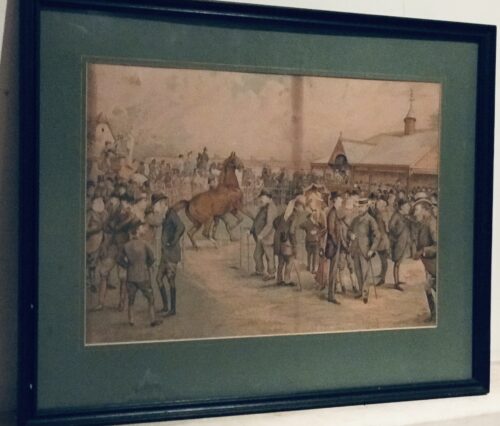 Humorous and very sharp depiction of the last remaining horse Fair in the North of Ireland ,Ballyclare Co Antrim.The character depictions of this 19th century scene are very vivid and convey brilliantly the busy,raucous and exciting atmosphere of Fair Day back then when the horse was all important and the automobile had not yet been invented .A wonderful print . Ballyclare Co Antrim 50cm x 63cm
Humorous and very sharp depiction of the last remaining horse Fair in the North of Ireland ,Ballyclare Co Antrim.The character depictions of this 19th century scene are very vivid and convey brilliantly the busy,raucous and exciting atmosphere of Fair Day back then when the horse was all important and the automobile had not yet been invented .A wonderful print . Ballyclare Co Antrim 50cm x 63cm -
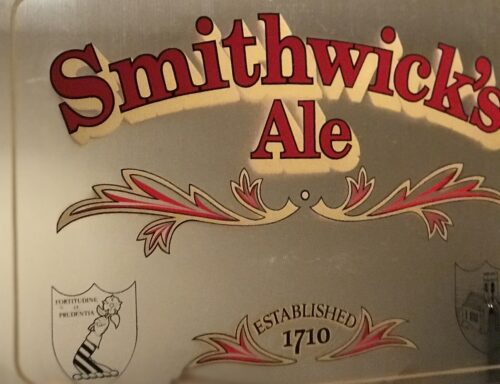
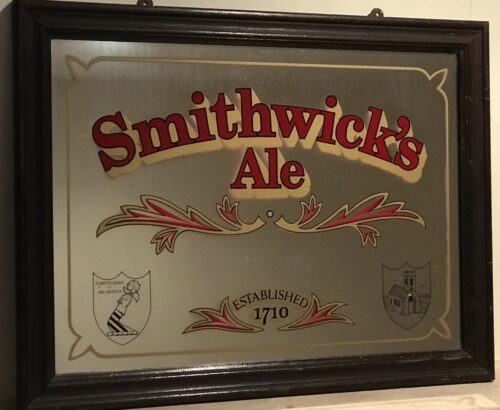 50cm x 65cm Artane Dublin Classic Smithwicks Ale Advertising Showcard-(1960s era)-Brewed in Ireland.Please contact us directly at irishpubemporium@gmail.com for pricing and shipment quotation. The old Smithwicks brewery is on the site of a Franciscan abbey, where monks had brewed ale since the 14th century, and ruins of the original abbey still remain on its grounds. The old brewery has since been renovated and now hosts "The Smithwick's Experience Kilkenny" visitor attraction and centre.At the time of its closure, it was Ireland's oldest operating brewery. John Smithwick was an orphan who had settled in Kilkenny. Shortly after his arrival, Smithwick went into the brewing business with Richard Cole on a piece of land that Cole had leased from the Duke of Ormond in 1705. Five years later, John Smithwick became the owner of the land. The brewery stayed small, servicing a loyal local following while John Smithwick diversified. Following John Smithwick's death, the brewery temporarily fell out of family hands. John Smithwick's great grandson, Edmond bought the brewery land back freehold and worked to reshape its future. Edmond concentrated on discovering new markets and successfully building export trade. Drinkers in England, Scotland and Wales developed a taste for Smithwick's brews and output increased fivefold. As a result of substantial contributions made to St Mary's Cathedral, Edmond became great friends with Irish liberal Daniel O'Connell, who later became godfather to one of his sons. Edmond Smithwick became well known and respected by the people of Kilkenny who elected him town mayor four times. In 1800, export sales began to fall and the brewing industry encountered difficulty. To combat this, the Smithwick family increased production in their maltings, began selling mineral water and delivered butter with the ale from the back of their drays.By 1900, output was at an all-time low and the then owner James Smithwick was advised by auditors to shut the doors of the brewery. Instead, James reduced the range of beers they produced and set out to find new markets. He secured military contracts and soon after saw output increase again. James' son, Walter, took control in 1930 and steered the brewery to success through the hardships of both World War II and increasingly challenging weather conditions.By January 1950, Smithwick's was exporting ale to Boston.Smithwick's was purchased from Walter Smithwick in 1965 by Guinness and is now, along with Guinness, part of Diageo. Together, Guinness & Co. and Smithwick's developed and launched Smithwick's Draught Ale in 1966. By 1979, half a million barrels were sold each year.In 1980, Smithwick's began exporting to France. In 1993, Smithwick's Draught became Canada's leading imported ale.By 2010, Smithwick's continued to be brewed in Dundalk and Kilkenny with tankers sent to Dublin to be kegged for the on trade market. Cans and bottles were packaged by IBC in Belfast.Production in the Kilkenny brewery finished on 31 December 2013 and Smithwicks brands are now produced in the Diageo St.James' Gate brewery in Dublin.The original Kilkenny site was sold to Kilkenny County Council, with a small portion of the site dedicated to the opening of a visitor's centre, the "Smithwick's Experience Kilkenny".
50cm x 65cm Artane Dublin Classic Smithwicks Ale Advertising Showcard-(1960s era)-Brewed in Ireland.Please contact us directly at irishpubemporium@gmail.com for pricing and shipment quotation. The old Smithwicks brewery is on the site of a Franciscan abbey, where monks had brewed ale since the 14th century, and ruins of the original abbey still remain on its grounds. The old brewery has since been renovated and now hosts "The Smithwick's Experience Kilkenny" visitor attraction and centre.At the time of its closure, it was Ireland's oldest operating brewery. John Smithwick was an orphan who had settled in Kilkenny. Shortly after his arrival, Smithwick went into the brewing business with Richard Cole on a piece of land that Cole had leased from the Duke of Ormond in 1705. Five years later, John Smithwick became the owner of the land. The brewery stayed small, servicing a loyal local following while John Smithwick diversified. Following John Smithwick's death, the brewery temporarily fell out of family hands. John Smithwick's great grandson, Edmond bought the brewery land back freehold and worked to reshape its future. Edmond concentrated on discovering new markets and successfully building export trade. Drinkers in England, Scotland and Wales developed a taste for Smithwick's brews and output increased fivefold. As a result of substantial contributions made to St Mary's Cathedral, Edmond became great friends with Irish liberal Daniel O'Connell, who later became godfather to one of his sons. Edmond Smithwick became well known and respected by the people of Kilkenny who elected him town mayor four times. In 1800, export sales began to fall and the brewing industry encountered difficulty. To combat this, the Smithwick family increased production in their maltings, began selling mineral water and delivered butter with the ale from the back of their drays.By 1900, output was at an all-time low and the then owner James Smithwick was advised by auditors to shut the doors of the brewery. Instead, James reduced the range of beers they produced and set out to find new markets. He secured military contracts and soon after saw output increase again. James' son, Walter, took control in 1930 and steered the brewery to success through the hardships of both World War II and increasingly challenging weather conditions.By January 1950, Smithwick's was exporting ale to Boston.Smithwick's was purchased from Walter Smithwick in 1965 by Guinness and is now, along with Guinness, part of Diageo. Together, Guinness & Co. and Smithwick's developed and launched Smithwick's Draught Ale in 1966. By 1979, half a million barrels were sold each year.In 1980, Smithwick's began exporting to France. In 1993, Smithwick's Draught became Canada's leading imported ale.By 2010, Smithwick's continued to be brewed in Dundalk and Kilkenny with tankers sent to Dublin to be kegged for the on trade market. Cans and bottles were packaged by IBC in Belfast.Production in the Kilkenny brewery finished on 31 December 2013 and Smithwicks brands are now produced in the Diageo St.James' Gate brewery in Dublin.The original Kilkenny site was sold to Kilkenny County Council, with a small portion of the site dedicated to the opening of a visitor's centre, the "Smithwick's Experience Kilkenny". -
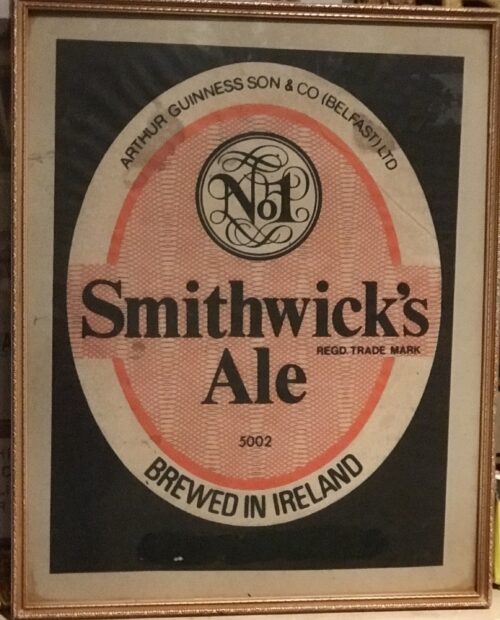
 40cm x 32cm Artane Dublin Classic Smithwicks Ale Advertising Showcard-(1960s era)-Brewed in Ireland. The old Smithwicks brewery is on the site of a Franciscan abbey, where monks had brewed ale since the 14th century, and ruins of the original abbey still remain on its grounds. The old brewery has since been renovated and now hosts "The Smithwick's Experience Kilkenny" visitor attraction and centre.At the time of its closure, it was Ireland's oldest operating brewery. John Smithwick was an orphan who had settled in Kilkenny. Shortly after his arrival, Smithwick went into the brewing business with Richard Cole on a piece of land that Cole had leased from the Duke of Ormond in 1705. Five years later, John Smithwick became the owner of the land. The brewery stayed small, servicing a loyal local following while John Smithwick diversified. Following John Smithwick's death, the brewery temporarily fell out of family hands. John Smithwick's great grandson, Edmond bought the brewery land back freehold and worked to reshape its future. Edmond concentrated on discovering new markets and successfully building export trade. Drinkers in England, Scotland and Wales developed a taste for Smithwick's brews and output increased fivefold. As a result of substantial contributions made to St Mary's Cathedral, Edmond became great friends with Irish liberal Daniel O'Connell, who later became godfather to one of his sons. Edmond Smithwick became well known and respected by the people of Kilkenny who elected him town mayor four times. In 1800, export sales began to fall and the brewing industry encountered difficulty. To combat this, the Smithwick family increased production in their maltings, began selling mineral water and delivered butter with the ale from the back of their drays.By 1900, output was at an all-time low and the then owner James Smithwick was advised by auditors to shut the doors of the brewery. Instead, James reduced the range of beers they produced and set out to find new markets. He secured military contracts and soon after saw output increase again. James' son, Walter, took control in 1930 and steered the brewery to success through the hardships of both World War II and increasingly challenging weather conditions.By January 1950, Smithwick's was exporting ale to Boston.Smithwick's was purchased from Walter Smithwick in 1965 by Guinness and is now, along with Guinness, part of Diageo. Together, Guinness & Co. and Smithwick's developed and launched Smithwick's Draught Ale in 1966. By 1979, half a million barrels were sold each year.In 1980, Smithwick's began exporting to France. In 1993, Smithwick's Draught became Canada's leading imported ale.By 2010, Smithwick's continued to be brewed in Dundalk and Kilkenny with tankers sent to Dublin to be kegged for the on trade market. Cans and bottles were packaged by IBC in Belfast.Production in the Kilkenny brewery finished on 31 December 2013 and Smithwicks brands are now produced in the Diageo St.James' Gate brewery in Dublin.The original Kilkenny site was sold to Kilkenny County Council, with a small portion of the site dedicated to the opening of a visitor's centre, the "Smithwick's Experience Kilkenny".
40cm x 32cm Artane Dublin Classic Smithwicks Ale Advertising Showcard-(1960s era)-Brewed in Ireland. The old Smithwicks brewery is on the site of a Franciscan abbey, where monks had brewed ale since the 14th century, and ruins of the original abbey still remain on its grounds. The old brewery has since been renovated and now hosts "The Smithwick's Experience Kilkenny" visitor attraction and centre.At the time of its closure, it was Ireland's oldest operating brewery. John Smithwick was an orphan who had settled in Kilkenny. Shortly after his arrival, Smithwick went into the brewing business with Richard Cole on a piece of land that Cole had leased from the Duke of Ormond in 1705. Five years later, John Smithwick became the owner of the land. The brewery stayed small, servicing a loyal local following while John Smithwick diversified. Following John Smithwick's death, the brewery temporarily fell out of family hands. John Smithwick's great grandson, Edmond bought the brewery land back freehold and worked to reshape its future. Edmond concentrated on discovering new markets and successfully building export trade. Drinkers in England, Scotland and Wales developed a taste for Smithwick's brews and output increased fivefold. As a result of substantial contributions made to St Mary's Cathedral, Edmond became great friends with Irish liberal Daniel O'Connell, who later became godfather to one of his sons. Edmond Smithwick became well known and respected by the people of Kilkenny who elected him town mayor four times. In 1800, export sales began to fall and the brewing industry encountered difficulty. To combat this, the Smithwick family increased production in their maltings, began selling mineral water and delivered butter with the ale from the back of their drays.By 1900, output was at an all-time low and the then owner James Smithwick was advised by auditors to shut the doors of the brewery. Instead, James reduced the range of beers they produced and set out to find new markets. He secured military contracts and soon after saw output increase again. James' son, Walter, took control in 1930 and steered the brewery to success through the hardships of both World War II and increasingly challenging weather conditions.By January 1950, Smithwick's was exporting ale to Boston.Smithwick's was purchased from Walter Smithwick in 1965 by Guinness and is now, along with Guinness, part of Diageo. Together, Guinness & Co. and Smithwick's developed and launched Smithwick's Draught Ale in 1966. By 1979, half a million barrels were sold each year.In 1980, Smithwick's began exporting to France. In 1993, Smithwick's Draught became Canada's leading imported ale.By 2010, Smithwick's continued to be brewed in Dundalk and Kilkenny with tankers sent to Dublin to be kegged for the on trade market. Cans and bottles were packaged by IBC in Belfast.Production in the Kilkenny brewery finished on 31 December 2013 and Smithwicks brands are now produced in the Diageo St.James' Gate brewery in Dublin.The original Kilkenny site was sold to Kilkenny County Council, with a small portion of the site dedicated to the opening of a visitor's centre, the "Smithwick's Experience Kilkenny". -
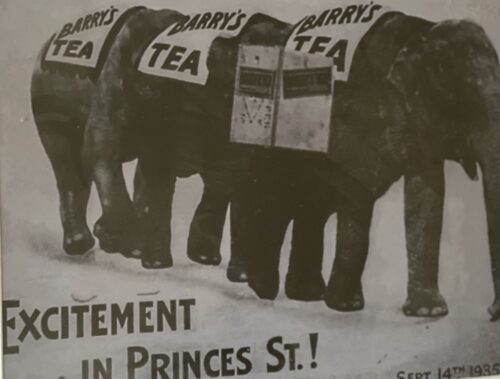
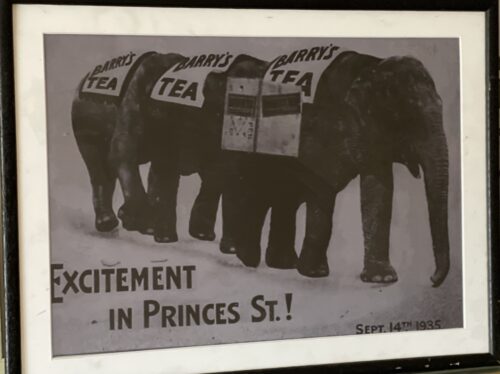 47cm x 35cm Barry's Tea is an Irish tea company founded in 1901 by James J. Barry in Cork. Until the 1960s, tea was sold from a shop in Prince's Street, but thereafter the company expanded its wholesaling and distribution operations. By the mid-1980s Barry's Tea had become a national brand. According to their website, they are currently responsible for 38% of all tea sales in the Irish market (which is worth an estimated €85 million annually). Today, Barry's Tea is also available in the United Kingdom, Spain, and in some areas of Canada, Australia, France, Luxembourg and the United States where there are significant Irish immigrant communities. Members of the Barry family been elected representatives for Fine Gael: the founder's son Anthony Barry (TD 1954–57 and 1961–65), Anthony's son Peter Barry (TD 1969–97) and Peter's daughter Deirdre Clune (TD 1997–2001 and 2007–11, and MEP since 2014).
47cm x 35cm Barry's Tea is an Irish tea company founded in 1901 by James J. Barry in Cork. Until the 1960s, tea was sold from a shop in Prince's Street, but thereafter the company expanded its wholesaling and distribution operations. By the mid-1980s Barry's Tea had become a national brand. According to their website, they are currently responsible for 38% of all tea sales in the Irish market (which is worth an estimated €85 million annually). Today, Barry's Tea is also available in the United Kingdom, Spain, and in some areas of Canada, Australia, France, Luxembourg and the United States where there are significant Irish immigrant communities. Members of the Barry family been elected representatives for Fine Gael: the founder's son Anthony Barry (TD 1954–57 and 1961–65), Anthony's son Peter Barry (TD 1969–97) and Peter's daughter Deirdre Clune (TD 1997–2001 and 2007–11, and MEP since 2014). -
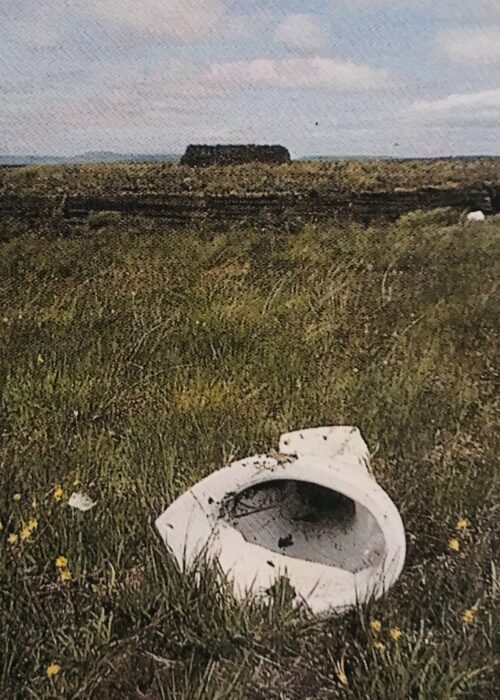
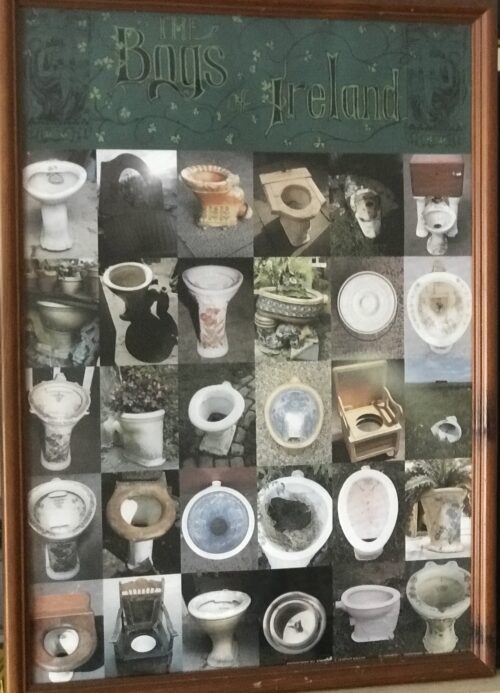 Well framed Bogs of Ireland Print. We were very fortunate to acquire this very famous poster-The Bogs of Ireland.A collage of some very interesting toilets recorded for eternity by the renowned photographer John Morris.This poster is now completely out of print and is difficult to acquire.Makes a wonderful addition to anyone's favourite sanctuary and place of solitude! Dimensions : 65cm x 45cm
Well framed Bogs of Ireland Print. We were very fortunate to acquire this very famous poster-The Bogs of Ireland.A collage of some very interesting toilets recorded for eternity by the renowned photographer John Morris.This poster is now completely out of print and is difficult to acquire.Makes a wonderful addition to anyone's favourite sanctuary and place of solitude! Dimensions : 65cm x 45cm -
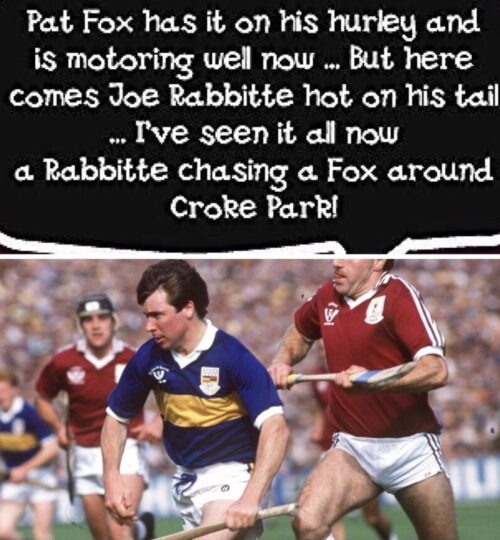
 45cm x 30cm Thurles Co Tipperary Classic commentary quote from the great Micheal O'Muircheartaigh. Micheal Ó Muircheartaigh (born 20 August 1930) is an Irish Gaelic games commentator for the Irish national radio and television, RTÉ. In a career that has spanned six decades he has come to be regarded as the "voice of Gaelic games." His prolific career has earned him a place in Guinness World Records Mícheál Ó Muircheartaigh was born in Dún Síon just outside Dingle, County Kerry in 1930.Ó Muircheartaigh grew up on the family farm and was educated locally in Dingle. In September 1945 he began studying at Coláiste Íosagáin in Baile Bhúirne in the County Cork Gaeltacht where he was in training to be a teacher. It was at this all-Irish school that his name changed from Michael Moriarty to the Irish version Mícheál Ó Muircheartaigh. In September 1948 he began the final year of his teacher training at St Patrick's College of Education in Drumcondra, Dublin.
45cm x 30cm Thurles Co Tipperary Classic commentary quote from the great Micheal O'Muircheartaigh. Micheal Ó Muircheartaigh (born 20 August 1930) is an Irish Gaelic games commentator for the Irish national radio and television, RTÉ. In a career that has spanned six decades he has come to be regarded as the "voice of Gaelic games." His prolific career has earned him a place in Guinness World Records Mícheál Ó Muircheartaigh was born in Dún Síon just outside Dingle, County Kerry in 1930.Ó Muircheartaigh grew up on the family farm and was educated locally in Dingle. In September 1945 he began studying at Coláiste Íosagáin in Baile Bhúirne in the County Cork Gaeltacht where he was in training to be a teacher. It was at this all-Irish school that his name changed from Michael Moriarty to the Irish version Mícheál Ó Muircheartaigh. In September 1948 he began the final year of his teacher training at St Patrick's College of Education in Drumcondra, Dublin.Broadcasting career
In early March 1949 Ó Muircheartaigh, along with ten other students from the college, and several from other colleges, did a test commentary on a hurling game at Croke Park. Each student had to commentate for five minutes in Irish and the most successful would be selected for further commentary work. Ó Muircheartaigh had never seen a game of hurling before in his life. But he knew that those adjudicators judging his commentary were not able to see the game:'Twas a new game to me. But I knew one person. He was in goal for UCD and his name was Tadhg Hurley. He went to school in Dingle and he had hurling because his father was a bank manager and had spent time in Tipperary or Cork. The moment my minute started, he was saving a fantastic shot. And he cleared it away out, I can still see it, out over the sideline, Cusack Stand side of the field, eighty yards out. But it was deflected out by a member of the opposition. The adjudicators couldn't see that that didn't happen. Who was called out to take the line-ball? The only person I knew, Tadhg Hurley. And he took a beautiful line-ball - Christy Ring never took better. He landed it down in front of the Railway goal, there was a dreadful foul on the full-forward, and there was a penalty. And who was called up to take the penalty? Tadhg Hurley. 'Twas the best individual display ever seen in Croke Park. It took him at least a minute to come from the Canal goal up. And while he was coming up I spoke about his brother Bob, who was in Donal's class, and his sister who used to come out to Dún Síon strand during the summer. So eventually he took the penalty. I've seen DJ Carey, I've seen Nicky Rackard, I've seen Christy Ring. None of them could ever equal the display he gave that day... Sin mar a thosaigh sé!
Ó Muircheartaigh was the one selected and his first assignment was to provide an all-Irish commentary on the 1949 Railway Cup final on St. Patrick's Day. He graduated from St. Patrick's College a little later and also completed a Bachelor of Arts degree from University College Dublin. He taught economics, accountancy and Irish in both primary and secondary schools throughout Dublin, the majority of which were run by the Christian Brothers. He continued teaching up until the 1980s, when he became a full-time broadcaster with Raidió Teilifís Éireann. For the early part of his broadcasting career Ó Muircheartaigh commentated on Minor GAA matches, in the Irish language. He also replaced the legendary Micheál O'Hehir when he was not available to commentate. Eventually when O'Hehir was forced to retire in the mid-1980s Ó Muircheartaigh took over as the station's premier radio commentator. He developed his own inimitable style of commentary and his accent is unmistakably that of a native Irish speaker. He is a true lover of Gaelic Athletic Association and it is reflected in the enthusiasm he brings to matches. His unusual turn of phrase has made him a much loved broadcaster and often imitated character. He has become particularly famous in Ireland for his unusual turns of phrase in the heat of the moment while commentating. Today he commentates on RTÉ Radio 1. In 2004 he published his autobiography, 'From Dún Sion to Croke Park'. Ó Muircheartaigh's commentaries for RTÉ Radio 1's Sunday Sport show won him a Jacob's Award in 1992. He was also the Parade Grand Marshal for the 2007 St. Patrick's Festival, having been given the honour by the chairman of the Festival in recognition and appreciation of his unique contribution to Irish culture. He will be the Parade Grand Marshal for the 2011 St. Patrick's Parade in Toronto, Ontario, Canada, also in recognition and appreciation of his unique contribution to Irish culture. On 16 September 2010 he announced his retirement from broadcasting. The last All-Ireland he commentated on was the 2010 All-Ireland Senior Football Championship Final on 19 September 2010.On 29 October 2010 it was announced that the 2nd International Rules test at Croke Park would be Ó Muircheartaigh's final broadcast as commentator on RTÉ Radio 1. On 30 October 2010 Micheál commentated his final commentary alongside RTÉ's pundit and former Meath footballer Bernard Flynn. He is contracted to officiate at the 2011–12 Volvo Ocean Race finish in Galway when he will commentate on the finish to the round the world race, to give it a uniquely Irish conclusion. Sailing has been a long time hobby of O Muircheartaigh. Ó Muircheartaigh writes a weekly sports column for Foinse, the Irish-language newspaper free with the Irish Independent each Wednesday. Ó Muircheartaigh was invited to read out a piece in Irish and in English at an event called "Laochra" in Croke Park on 24 April 2016 to commemorate the 100th anniversary of the Easter Rising.Other media
He is the main commentator in the 2005 video game Gaelic Games: Football for the PlayStation 2 and its 2007 sequel He was featured in the video "Mícheál Ó Muircheartaigh - Making a ham sandwich" which was posted on a Reddit forum, noting his "relaxing" voice.Honours
Mícheál was awarded an honorary doctorate by NUI Galway in 1999 for his lifetime service to broadcasting.

